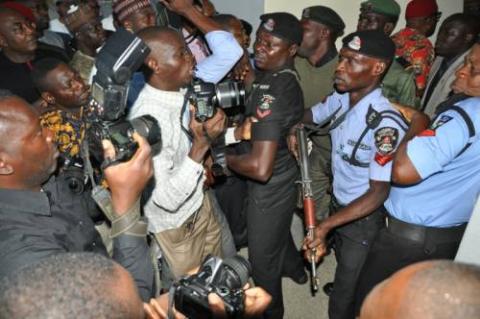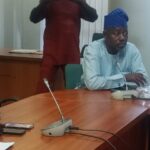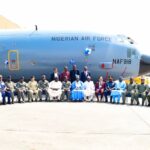…….Seeks Inclusivity of Women, PLWDs in Report
By Stella Omona

The International Press Centre (IPC) has said about 250 journalists were molested while covering the 2019 general elections across the country even as it seeks more inclusivity of women and People Living with Disabilities (PLWDs) in media coverage.
The Executive Director of IPC, Mr.. Lanre Arogundade disclosed this on Tuesday at a one-day Stakeholders’ Roundtable on the Media Monitoring Report of Coverage of Elections & Presentation of the Revised Nigeria Media Code of Election Coverage supported by the European Union Support to Democratic Governance in Nigeria (EU-SDGNII), in Abuja.
14 newspapers consisting of 10 print newspapers and 4 online newspapers were sampled and monitored from October- November, 2022.
Speaking on the ‘ Imperatives of the Nigeria Media Code of Election Coverage in Reporting the 2023 Electoral Process, Arogundade who enjoined journalists to demand insurance cover from their media organisations if asked to cover violence prone areas said political parties should support investigation of any form of assault or harassment on journalists and ensure that alleged perpetrators are promptly brought to justice.
He noted that the lessons of the 2019 monitoring exercise have informed the design and the approach of the current monitoring exercise centred around the 2023 elections.
“No journalist was killed on election duty in 2019 but about 250 journalists were molested across the country.
“The basic steps to take include ensuring you have INEC accreditation; checking your health status before going to the field; demanding for insurance cover from your employers especially if you are asked to cover election in violence prone areas; making sure that you have contact details of those to reach in case of emergency and staying away from mobs should there be violence.
“Additionally, journalists on election duty should avoid riding to campaign activities of political parties in the convoy of candidates and refrain from donning party insignias even if your employer is a politician or a candidate.”
He maintained that the essence of the event was to discuss how journalists in the course of covering the ongoing electoral processes have fared.
“Presenting the monitoring reports and the revised Media Code of Election Coverage, affords us the opportunity to assess how well we have so far fared in the performance of our duties and obligations. Among others, monitoring helps to measure the amount of professionalism, ethical compliance and access to parties and candidates, especially in the context of the guidelines provided by the relevant frameworks that govern media role at elections including the Electoral law, statutory regulations such as the Nigeria Broadcasting Code and self-regulatory like the Media Code of Election Coverage.
“This roundtable is pursuant to the aims and objectives of Component 4: Support to Media of EU-SDGNII project being implemented by IPC (lead partner) and the Institute for Media and Society (IMS) to enhance the Nigerian media’s role in promoting democratic governance through fair, accurate, ethical and inclusive coverage of electoral processes and elections in Nigeria.
“The overall goal of activities under the project including but not limited to capacity building for journalists on issue focussed, factually accurate and conflict-sensitive reporting of elections, capacity building for female candidates on strategic communications and media use and engagements on countering disinformation and misinformation, are designed to ensure that journalists and their news mediums pay maximum attention to ethics, professionalism and inclusivity, because such help to help facilitate credible elections, without which democracy cannot be consolidated.
The expert reviewer, Professor Abigail Ogwezzy-Ndisika of the Department of Mass Communications, University of Lagos said the report presented a practical direction as to what to do as journalists to deepen democracy knowing that the media is a critical institution in elections.
“Self evaluation is important for us to shape our work. We found out that inclusivity is poor in terms of sourcing of news and so we are practically reportng those people we have been reporting in the past. Not only that, it has become more of urban-centre. So, we should delve a little more into sub-national level, I think that will improve the work.
“It was observed that enough prominence was not given to the topics of women, youths and PWDS, as they were not sufficiently projected on the front page of the print newspapers.In the Online newspapers, it was also observed that female/women and other under-represented groups were poorly projected where 12 Female Politicians at 2%, 3 Female Candidates at 0.5%; 2 Women at 0.3%, 6 Youths at 0.9% and 1 PWDs at 0.2% were captured as sources out of 607 were 290 Male Politicians at 47.6% and 169 Male Candidates at 27.8%) were cited as sources.”
She recommended that; ” The print and online newspapers should consciously include and engage more women, female politicians and under-represented groups as voices/sources in election reporting; additionally prominence should be given to their issues being made headline stories and regularly featured on the front pages.”
“We have to be deliberative, make our stories multi-media so that we can speak to non-literate people in the rural areas so that we can have them included.
“The report did say that we didn’t have hate speeches during the period study, October- November, 2022. So, if we continue to do that, we will reduce conflict. I want us to keep that up because we need to have credible elections and national cohesion.”
General Secretary, Nigeria Guild of Editors (NGE) stressed that journalists should interrogate their sources.
“Don’t trust your sources. There is need to interrogate even the press releases we get. As reporters, we must develop the discipline of verification.”
One of the highlights of the event was the presentation of the Revised Nigeria Media Code of Elections Coverage.


